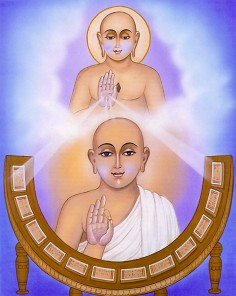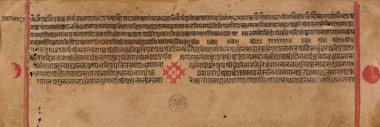Twenty-First Lecture: Samudrapāla
In Champā there lived a Śrāvaka, the merchant Pālita, who was a disciple of the noble and venerable Mahāvīra. (1)
As a Śrāvaka he was well versed in the doctrines of the Nirgranthas. Once he went by boat to the town of Pihuṇḍa on business. (2)
A merchant gave him his daughter while he was doing business in Pihuṇḍa. When she was big with child, he took her with him on his returning home. (3)
Now the wife of Pālita was delivered of a child at sea; as the boy was born at sea (samudra), he was named Samudrapāla. (4)
Our merchant, the Śrāvaka, went leisurely to Kampā, to his house; in his house the boy grew up surrounded by comfort. (5)
He studied the seventy-two arts, and acquired knowledge of the world;[1] he was in the bloom of youth, and had a fine figure and good looks. (6)
His father procured him a beautiful wife, Rūpiṇī, with whom he amused himself in his pleasant palace, like a Dōgundaga god.[2] (7)
Once upon a time he saw from the window of his palace a man sentenced to death, dressed for execution, on his way to the place of execution. (8)
Agitated by what he saw, Samudrapāla spoke thus: "Of wicked actions this is the bad result." (9)
He became enlightened at once, the venerable man, and he was immensely agitated; he took leave of his parents, and entered the state of houselessness. (10)
Abandoning the great distress to which the worldly[3] are liable, the great delusion, and whatever causes fear, one should adopt the Law of monks,[4] the vows, the virtues, and the (endurance of) calamities. (11)
One should keep the five great vows, viz. not to kill, to speak the truth, not to steal, to be chaste, to have no property whatever; a wise man should follow the Law taught by the Jinas. (12)
A monk should have compassion on all beings, should be of a forbearing character, should be restrained and chaste, and abstaining from everything sinful; he should live with his senses under control. (13)
Now and then[5] he should travel in one country, taking into consideration its resources and his own ability; like a lion he should not be frightened by any noise; and whatever words he hears, he should not make an improper reply. (14)
In utter indifference he should walk about, and bear everything, be it pleasant or unpleasant; he should not approve of everything everywhere, nor care for[6] respectful treatment or blame. (15)
There are many opinions here among men, which a monk places in their true light; there will rise many dangerous and dreadful calamities, caused by gods, men, or animals, which are difficult to be borne and cause easily-discouraged men to sink under them; but a monk who comes in contact with them will not be afraid, like a stately elephant at the head of the battle. (16, 17)
Cold and heat, flies and gnats, unpleasant feelings, and many diseases attack the body; without flinching[7] he should bear them, and should not recall to his memory the pleasures he once enjoyed. (18)
Giving up love, hatred, and delusion, a monk who is always careful and who is steadfast even as Mount Mēru cannot be shaken by the storm, should bear calamities, guarding himself. (19)
A great sage should be neither too elevated by pride nor too humble, he should not care for respectful treatment nor blame; an ascetic who has ceased (to act), will by means of his simplicity enter the path of Nirvāṇa. (20)
He is neither grieved nor pleased (by anything),[8] he abandons his relations with men, he ceases (to act), is intent on the benefit of his soul, he strives for the highest good (viz. mukti), and uses the means to reach it, free from sorrow, egoism, and any kind of property. (21)
A merciful (monk) should use beds distant from others, which are not got ready for his sake[9] nor strewn (with leaves or things considered to be possessed of life); he should sustain such hardships as the sages are accustomed to. (22)
The great sage (Samudrapāla), understanding the sacred lore and practising completely the best Law, shone forth like the sun in the sky, being possessed of the highest knowledge and glory. (23)
Having annihilated his Karman both meritorious and sinful, being steadfast,[10] and free from all fetters, Samudrapāla crossed the ocean-like Flood of worldly existence and obtained exemption from transmigration. (24)
Thus I say.
Saggantha = sagrantha, which is obviously the opposite of nirgrantha. The commentators correct saṃgaṃtha in saṃgaṃ cha. The original reading is in MS. B. A. has saṃgaṃtha, and so had C. originally, but it corrects the that into cha. According to the commentators we should translate: abandoning worldly attachment which causes great distress, great delusion, black (Lēśyā), and dangers, one should, etc.
Paryāya-dharma. Paryāya means a state under which a substance presents itself. Here is meant the state of the soul in pravrajyā, i.e. śrāmaṇya-paryāya; compare the expressions chadmastha-paryāya and kēvali-paryāya. Paryāya-dharma is here equal to prayrajyā-dharma, Law of the monks.
Kālēṇa kālaṃ, the commentators supply kurvan, and explain the passage as follows: kālēna, i.e. in a pauruṣī (four hours) less one quarter of it, kālam, i.e. what is proper for the time. The meaning would be "doing at every time what is proper or prescribed to do at it." But this explanation looks very artificial; I think that the expression kalēṇa kālaṃ is an adverb of the same type as majjhaṃ majjhēṇa and many others.
Saṃjae. This word may be saṃyata in this place; but in verse 20, where the same line occurs again, it cannot be so interpreted, because there the word saṃjae occurs twice; once it has the meaning of saṃjata, but in the passage under discussion it must be a verb, and it is rendered there sañjayet = saṅgaṃ kuryāt by the commentators.
Akukkuō, translated akukūja, derived from the root kūj "to warble, to groan"; it would therefore mean "without complaint." But in I, 30 we have appakukkuē, derived from the root kuch "to bend, to be crooked," and it is rendered alpaspandana. The same meaning applies in the present case.
This is the meaning commonly given to the frequently occurring phrase arairaisahe. Another interpretation is: saṃyamā-saṃyamaviṣayē, tābhyāṃ na bādhatē.
 Ganadhar Sudharma Swami
Ganadhar Sudharma Swami
